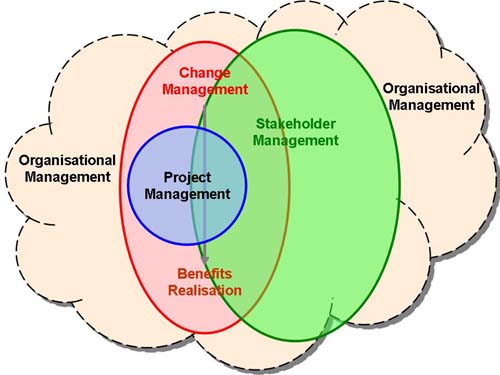When considering stakeholders, there are very few one-to-one relationships. Most stakeholders are, and have been, influenced by a range of relationships in and around your project, program and your organisation.
Stakeholder management is a key facet of organisational management where stakeholder management is often aligned with marketing, branding and corporate social responsibility (CSR) initiatives.
Similarly, stakeholder management central to change management and the ability to realise the benefits the change was initiated to deliver. The benefits will not be realised unless the key stakeholder communities accept and embrace the changes.
Project and program management also has a focus on effective stakeholder management. In a change initiative, the project and/or program undertakes the work to deliver the elements needed to facilitate the change but are only ever part of the journey from concept to realised value.
A typical evolution of a change initiative would flow along these lines:
- The organisation decides on a major organisational restructure and as a consequence initiates a change management process and appointed a change manager.
- The change manager develops the business case for the program of work and the executives responsible for the organisations portfolio management approve the business case and agree to fund and resource the program.
- The program manager sets up the program management team, established the program management office (PgMO) and charters a series of projects to develop the various deliverables needed to implement the change.
- The projects deliver their outputs.
- The program integrates the outputs with the operational aspects of the organisation.
- The organisation’s management make effective use of the new systems and processes.
- Value is created for the organisation and its owners.
The change manager is the sponsor and primary client for the program but the people who need to be convinced of the value of changing are the operational managers and their staff. If the organisation does not accept and use the new systems and processes very little value is generated.
Within this scenario, stakeholders in the operational part of the organisation, and particularly the managers will be key stakeholders for a range of different entities:
- They are stakeholders in the organisation itself and part of the organisational hierarchy.
- They are stakeholders in the change process being managed by the change manager.
- As end users of the new systems and processes they are also stakeholders of the program.
- As subject matter experts (SMEs) they are likely to be stakeholders in at least some of the projects.
In one respect change management is stakeholder management. Therefore, in a change management initiative, stakeholder management should be an integrated process coordinated at the change manager’s level. All of the organisational elements working on the change need to coordinate their stakeholder management efforts to support the overall outcome. Confusing and mixed messages don’t help anyone.
But this is just one typical business scenario. When considering stakeholders, there are very few one-to-one relationships. Most stakeholders are, and have been, influenced by a range of relationships in and around your organisation. Consequently, focusing on a simple one-to-one view is unlikely to provide the best outcome for anyone.
Effective stakeholder management requires a mature organisational approach. One approach to developing this capability is the SRMM (Stakeholder Relationship Management Maturity) model described in my book. Stakeholder Relationship Management: A Maturity Model for Organisational Implementation. I will outline the SRMM model in a later post.



Pingback: January Posts « Stakeholdercircle’s Blog
Pingback: 2010 in review | Aavssitedev’s Blog